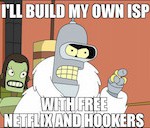Now that the daily news cycle has shifted its focus from the end of human civilization (net “neutrality” rollbacks) to the latest outrage du jour over yet another autisticly unfiltered remark from Donald Trump (“s*****le countries”) now would be the ideal moment for a small dose of “the truth hurts.”
“Net Neutrality” is yet another Orwellian up-is-down state propaganda that does the exact opposite of the plain meaning of the words (e.g. see Social Security, Affordable Care, Patriot Act, etc.). Were one to introduce a bill called “Shipping Neutrality” that required all shipping carriers use the same vehicles over the same routes and charge the same amount to everyone regardless of package size or distance, then perhaps it might dawn on the proponents of net neutrality just how absurd their position is. The absurdity swells further when one stops to ponder the fact that the explosive growth and innovation occurring on the net occurred in an unregulated environment. Then in 2015 the FCC changed the regulatory landscape and “net neutrality” was born. A mere 2 years later it is being undone yet somehow the internet as we know it is going to come crashing down around us. I’d like to take a moment of silence so we may ponder the dark days on the net that were 2014.
The internet has flourished not despite a lack of regulation but because of it. Innovators were not required to approach the crown on bended knee in order to be granted permission to innovate. To get a glimpse of government oversight of a rapidly innovating industry look no further than the FDA. A massive backlog of drug applications (innovations) at the FDA creates an unending queue of useful products languishing in limbo while development costs skyrocket during the endless wait. Innovation in a state run economy moves at the speed of a single elderly Wal-Mart greeter. Such a drip-wise pace might seem adequate, that is until you have experienced the waterfall of innovation that is produced in the unfettered and unregulated free market economy (e.g. the internet).
The proponents of net neutrality are oddly conservative in their tactics. For conservatives change is bad. It’s bad because it instills FUD (fear, uncertainty, doubt) in their heart. Those pushing the net neutrality agenda also play that fear card. They would have us believe our favorite websites will be slowed or blocked altogether if we don’t pay an endless litany of new fees. They see an á la carte internet (paying only for services you need) as tantamount to Sophie’s Choice. Please. Given the level of public outrage over even the thought of these ideas no ISP would be foolish enough to try such a thing. They would immediately lose their customers to ISP’s that did not engage in the hated practice.
But, and here’s the truth that hurts that nobody wants to face: it is their right to do whatever they wish. If they want to block websites, throttle speed, charge more or less for different services that is their right. If you own it you can do whatever you want with it. Just because modern society has become dependent on certain services (electricity, phone, internet, television, etc.) does not mean those things are basic human rights that must be supplied in an unaltered state at a fixed cost ad infinitum. For anyone to categorically state that another party must supply them with X at Y cost for Z duration and that if they don’t they’ll get their buddy Mr. Government to beat the living crap out of them until they do is the height of hypocrisy. It is hypocritical because you can be quite certain they would object if someone approached them with the same demand, that is, that they now must give their labor for others at some price and duration for which they have no say and that if they refuse to do so they will be thrown in a cage.
Neutrality delivered via the barrel of a gun goes by another name: tyranny. (for parts 1-3 see this page)


